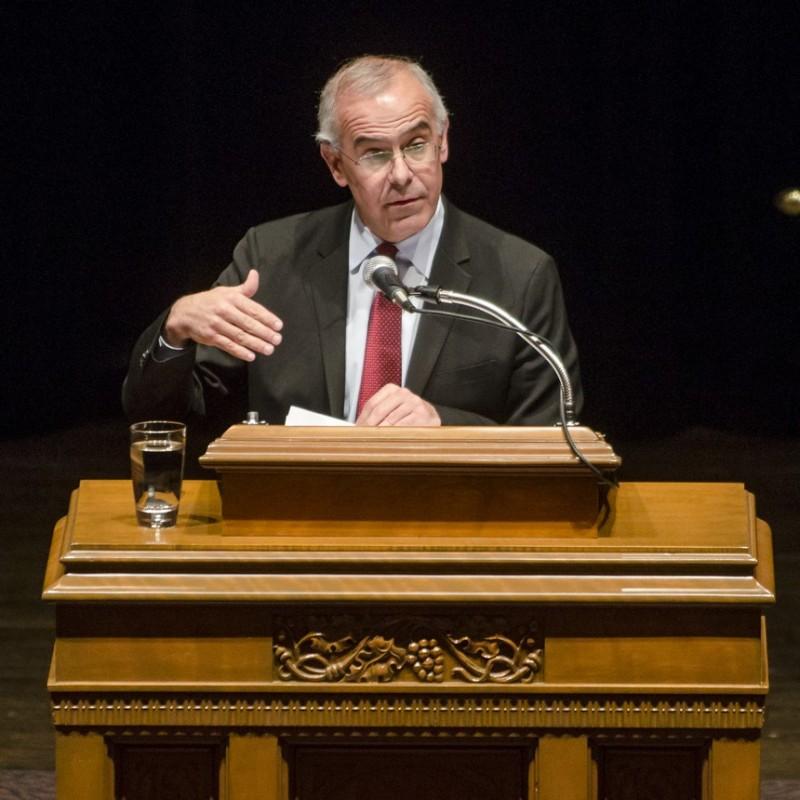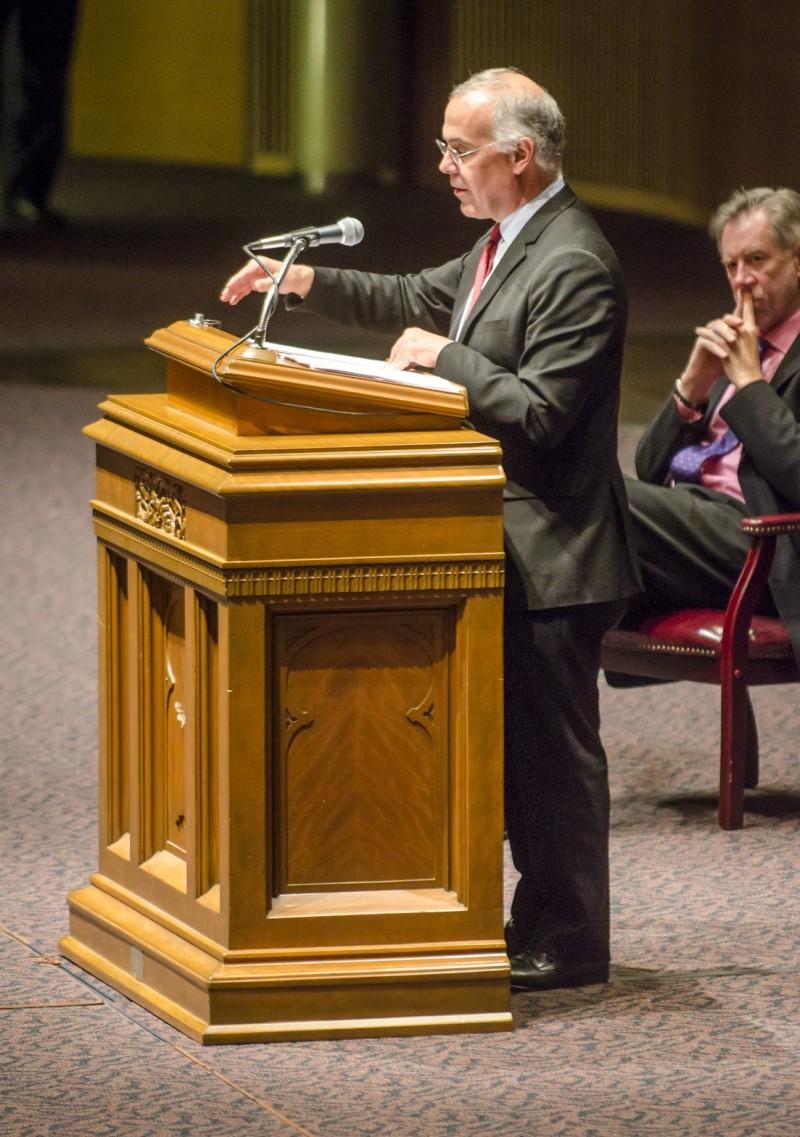On Wednesday, Nov. 12 author and journalist David Brooks spoke to Trinity University as part of the Distinguished Lecture series. He attended a small student question and answer session earlier in the day, answering questions over politics, journalism, and life, later giving his lecture in Laurie Auditorium where he addressed the crowd over issues of citizenship and answered a variety of questions from the Trinity and San Antonio communities.
David Brooks, often called a conservative by liberals and a liberal by conservatives, is best known for his work at the New York Times, where he currently resides as an op-ed columnist, commentating on issues of politics, from the recent midterm elections to increasing political partisanship. Prior to his work at the New York Times, Brooks, according to his biography on the New York Times webpage, “has been a senior editor at The Weekly Standard, a contributing editor at Newsweek and the Atlantic Monthly, and he is currently a commentator on “The Newshour with Jim Lehrer.””
Alongside these jobs, Brooks is also an author of three books, “Bobos in Paradise: The New Upper Class and How They Got There,” “On Paradise Drive: How We Live Now (And Always Have) in the Future Tense” and his most recent publication, “The Social Animal: The Hidden Sources of Love, Character, and Achievement.”
In his Q&A with students, Brooks took questions over his political stance and gave advice to students for their university years and post-graduation years.
Brooks, a self-identifying conservative following a Hamiltonian tradition, commented on the current fragmentation of the Republican Party, citing a need for more focus on social capital and mobility along class status lines.
“The Democrats deal with equality,” Brooks said. “Republicans need to focus on mobility.”
Brooks explored the concept of social capital and his belief in government spending to help achieve mobility for all citizens, a statement that many feel reflects his less definable political ideology. Brooks also took questions from students about life outside of college.
He also gave advice on the importance of establishing meaningful relationships with loved ones and friends, something he noted is often pushed aside for academic studies.
Other past lectures of the series have included Watergate journalists Bob Woodward and Carl Bernstein, ex-Secretary of Defense Robert Gates and previous British Prime Minister Gordon Brown.This year’s distinguished lecturer, Brooks opened with anecdotal experiences of his childhood and experience in America, from his time in New York, to his time at Chicago University.
“Chicago is a Baptist school where atheist professors teach Jewish students to say Thomas Aquinas,” Brooks said.
Focusing on the elements of citizenship in the U.S., Brooks offered humorous takes on American life.
“If you really want to understand America, watch an American man buy a barbecue grill at a Home Depot; it is when he’s most emotionally exposed,” Brooks said. “Outside there is a Petco over here, a Petsmart over there, Bed Bath and Beyond, Linens and Things and across the gigantic parking lot an Old Navy large enough to qualify for the United Nations.”
Many students enjoyed Brooks’s opening and anecdotal approach to citizenship in America.
“I really enjoyed his humor,” said junior Zachary Galvin. “He was able to joke about himself and his experiences alongside societal norms.”
At the core of his lecture, Brooks discussed the importance of citizenship and what makes a good citizen.
“The most important journey for all of us is a journey towards citizenship and character,” Brooks said.
Brooks offered a fundamental understanding of citizenship and its qualities.
“Citizenship is a quality, not of politics, but a quality of character and decency; are you behaving in a way that is moral and good,” Brooks said. “The way I think of those virtues is this, there are two set of virtues in the world.”
These two sets of virtues, Brooks stated, are divided between eulogy virtues and resume virtues, the latter of which, he argues, society focuses too much on.
“Resume virtues are related to the job market, the career. The eulogy virtues are the things they say about you after you are dead, were you courageous, honorable, honest; these are sort of non-overlapping virtues,” Brooks said. “The eulogy virtues are more important, but the resume virtues are the ones we talk about the most.”
He stated that these virtues are the defining functions of citizenship, with the importance on the resume virtues primary.
“Citizenship is a function of the eulogy virtues, how you behave if you behave in a virtuous manner that makes you a good citizen,” Brooks said.
Continuing along these lines of duality and of human virtues, Brooks offered insight from author and theorist Joseph B. Soloveitchik and his book “The Lonely Man of Faith” in describing the “two Adams.” These two “Adams” showcase the two selves of one’s identity, with different focuses for each. These two selves parallel the two virtues according to Brooks.
“Adam one seeks accomplishments; two savors the love of the family. Adam one asks how things work; two asks why things exist. Adam one wants to venture forth; two wants to return to roots,” Brooks said. “Adam one’s moto is success; Adam two’s motto is love, redemption and return.”
To many students, these ideas of virtues and citizenship were fascinating, especially the dichotomy between the two types of virtues.
“The first [self] is concerned with resume virtues, the skills you’re supposed to amass,” said junior Eliza Grady. “The second part of us is concerned with eulogy virtues, like strength and kindness. I think that’s really beautiful.”
Ending his lecture, Brooks took the chance to quote Reinhold Niebuhr, an American theologian and intellectual, in describing the importance of character, relationships and establishing a meaningful citizenship.
“Nothing that is worth doing can be achieved in our lifetime; therefore we must be saved by hope. Nothing which is true or beautiful or good makes complete sense in any immediate context of history; therefore we must be saved by faith. Nothing we do, however virtuous, can be accomplished alone; therefore we must be saved by love. No virtuous act is quite as virtuous from the standpoint of our friend or foe as it is from our standpoint. Therefore we must be saved by the final form of love, which is forgiveness.”








